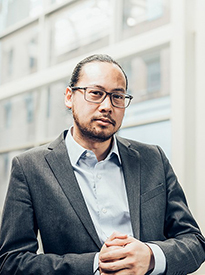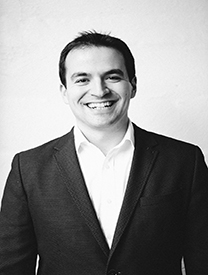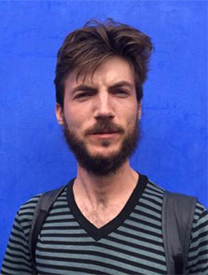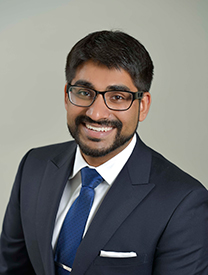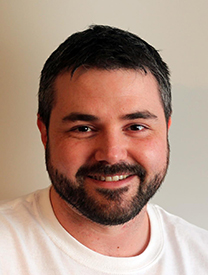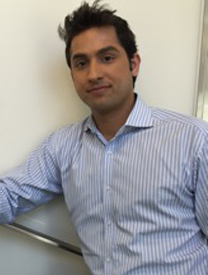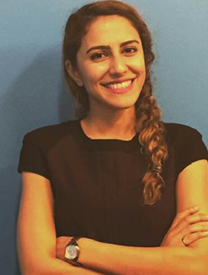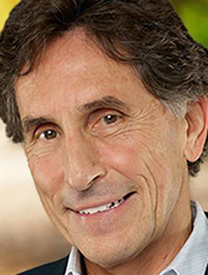Engineering Entrepreneurship Series
Have you ever thought of starting your own company but wondered where to begin? Do you have a great idea but don’t know how to get funding?
Engineers often make great entrepreneurs and many do well in business — more than 25% of all Canadian CEOs are engineers. U of T Engineering strives to foster a ‘culture of entrepreneurism’ to instill the notion that making a company happen is just what engineers do! The goal of the Engineering Entrepreneurship Series (EES) is inspirational — to have recent graduates as well as veteran entrepreneurs come in and tell the stories of their companies and share their experiences.
These one-hour talks begin at 5 p.m. and are often held in room 1105 of the Sandford Fleming Building, 10 King’s College Road, University of Toronto. The talks are followed by an informal dinner with the speaker. You do not need to RSVP to attend the talk, but RSVPs are required to attend dinner. RSVP for a dinner now, or email Jessica MacInnis for more information.
Past Engineering Entrepreneurship Series
Carlo Perez, Swift Medical
Title: The Iron Ring: From ECE to Everest to Entrepreneur
Thursday, September 27, 2018, 5-6 p.m.
Sandford Fleming, room 1105
Abstract: In this candid talk about his life to date, Carlo Perez (0T2+PEY, Founder and CEO of Swift Medical, and Finalist for 2018 EY Entrepreneur of the Year) shares personal stories of success and failure along his unexpected journey into entrepreneurship, and how his experiences in engineering – and the Iron Ring, in particular – have been a crucial guide for him the entire way.
If you’re interested in what lies beyond graduation, the unique value of your engineering education to the greater good, or just hearing a good story of just how far your iron ring can take you, this is a talk for you.
Bio: Carlo Perez is an engineer and entrepreneur, passionate about delivering designs and transformative technologies that put empathy into action. Raised by a father who was a trained engineer and a mother who worked as a nurse, Carlo spent seven years in R&D at Advanced Micro Devices (AMD) Inc., where his research focused on industry-leading 3D graphics hardware. In 2009, after a year of hitchhiking, Carlo found a calling teaching post-graduate engineering at Humber College, covering subjects that ranged from RF technology to advanced robotics. During this time, he explored novel applications of state-of-the-art visioning technology with his future Swift Medical co-founders – a path that led them to wound care. Today, after three short years, Swift Medical is the category leader in digital wound care management, adopted by over 1,000 facilities to monitor over 100,000 beds across North America.
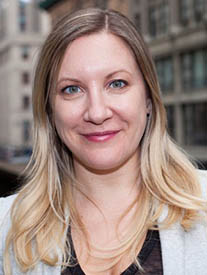 Erika Mozes, Hyr
Erika Mozes, Hyr
Title: So, I have an idea… now what?
Thursday, October 11, 2018, 5-6 p.m.
Sandford Fleming, room 1105
Abstract: Erika’s track to co-founding Hyr was far from a straight line. In this talk, Erika will speak about how a former political staffer turned lobbyist – with no technical background – found herself building a venture backed tech business. She will outline how her idea for Hyr lead to her and her husband to quit their corporate jobs, sell their condo, and go all in. And how she believes it was the best – yet riskiest – move they’ve ever made. Today Hyr connects over 800 businesses in Toronto and New York to hourly paid workers when they need them – so they can fill any shift, at any time. Hyr’s latest round of funding was led by Flybridge Capital Partner with follow on by Newark Venture Partners and XFactor.
Bio: Having experienced the struggles of hourly paid shift work first hand, as well as working in a corporate environment where access to labour was an increasingly pressing issue, Erika looked to solve the gap and co-founded Hyr in 2015.
Prior to jumping headfirst into startup life, Erika had an extensive career in the public and private sectors. She was a public affairs executive with experience representing multinational corporate brands including McDonald’s, GlaxoSmithKline, and Coca-Cola. Erika also served multiple senior communication and issues management roles in government and on campaigns. In this capacity, she also acted as a political pundit for national TV, radio, and print.
Erika has an honors degree of political science from Western University, and a post graduate degree in Public Administration from the Business School at Humber College of Applied Arts and Technology.
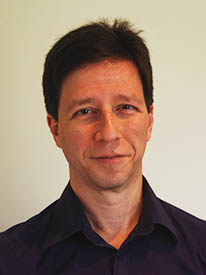 Richard Reiner
Richard Reiner
Title: Building Startups in Canada – Tales from the Trenches
Thursday, November 1, 2018, 5-6 p.m.
Sandford Fleming, room 1105
Abstract: Richard will talk about the experience of building a high-growth startup in Canada, drawing on the stories of half a dozen high-tech startups he has led, including companies now owned by Intel, Dell, and Trend. Richard will talk about the (many) mistakes he made along the way, surviving the resulting near-death experiences, navigating through exits and life post-acquisition, and a few lessons learned.
Bio: Dr. Richard Reiner is a serial entrepreneur and company builder, active as an executive, investor, advisor, and Board member.
He is currently Executive Chair of Fluent.ai, a speech AI company; Executive Chair of EOS Canada, a blockchain company; and Chair of Cybeats, an IoT security company.
He was previously Chief Technology Officer – Safe Identity, in Intel’s Security Group. He was President of PasswordBox, the leading digital identity company, leading up to the company’s acquisition by Intel. He was Chairman & CEO of Enomaly, a global leader in cloud computing, until Enomaly’s acquisition in 2011; and was the founder, CEO, and CTO of Assurent, a cybersecurity company (acquired in 2006).
He has served on the Boards and Advisory Boards of many leading cybersecurity, cloud, and mobile companies such as Immunio, Elliptic Technologies, Virima, CloudeAssurance, Veracode, NetClarity, Virima, and Fonolo.
He is often quoted by the press, in media such as the New York Times, CBS, NBC, USA Today, and CIO. He holds a Ph.D. and numerous patents in the fields of software and cloud security.
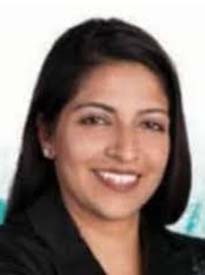 Mai Mavinkurve
Mai Mavinkurve
Title: We’re talking about a data revolution!: Technology & Politics in the Data Trust Era
Thursday, February 28, 2019, 5-6 p.m.
Sandford Fleming, room 1105
Abstract: Mai went from not wanting to be an engineer at all to being one of the first women in Canada to found an AI company. In this open talk Mai will share stories about her experiences as an engineer, an entrepreneur, a business leader and trying to make it all work with a family. But more importantly, Mai offers insight about the emerging Data revolution. As consumers, citizens and individuals we enjoy the conveniences and luxuries of technology… but at what cost? From election tampering, to hacking, to giving away our information without knowledge, the power and profitability of data has become evident. The fight for our data rights–as a country, as communities and as individuals has already begun. Learn more about how Mai’s company is addressing this new reality–of technology, politics and privacy–with the creation of an AI and Data Trust platform.
Bio: Mai is the COO and Co-Founder of Sightline Innovation, and one of the first female founders of an Artificial Intelligence company in Canada. As a member of the ISED Economic Strategy – Digital Industries Table, she led the sub-group that developed national data strategy and IP recommendations. She has also represented Canada at the G7 ministerial meetings on AI and the future of work. Mai is an experienced engineer and executive leader with a strong background in applied Artificial Intelligence/Machine Learning and Enterprise software development. Mai has a strong track record in management and delivery with a focus on the practical applications and implications of AI. Mai was recently acknowledged as one of 30 Most Influential Women in AI in Canada.
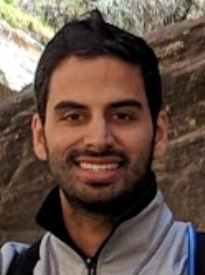 Harpaul Sambhi
Harpaul Sambhi
Title: Lessons of Bootstrapping Your Tech Start-Up to Millions
Thursday, March 7, 2019, 5-6 p.m.
Sandford Fleming, room 1105
Abstract: Not all start-ups should immediately make fundraising their #1 Priority. While it’s true that creating technology companies is becoming easier with technological advancements, building a sustainable company that customers love is still the same effort: very difficult. Harpaul bootstrapped his enterprise software company to profitability in the ages of well-funded competitors and public companies that built similar offerings. Learn how he made customers his #1 advocate that ultimately let Careerify win deals when they shouldn’t have. It’s an open forum that will allow you to get to ask questions that will help you with your challenges today.
Bio: Harpaul Sambhi is an entrepreneur and current angel investor. He bootstrapped his first business, Careerify, serving over 250,000 users globally at customers such as Microsoft, Deloitte, Unilever, Blizzard Activision, and SpaceX. Careerify achieved profitability within it’s second year of business and was acquired by LinkedIn in 2015, marking LinkedIn’s first acquisition outside of the United States. Harpaul joined LinkedIn and rebuilt Careerify and oversaw LinkedIn’s HCM initiative, and led product development for LinkedIn’s partner ecosystem in the recruitment space. After LinkedIn was acquired by Microsoft, Harpaul joined Microsoft’s Dynamics product team to build a best in class HR technology suite. During his professional career, Harpaul has been fortunate to write a book, Social_HR, published by Carswell/Thomson-Reuters, analyzing the impact of social media on the HR Industry. This led to some very fortunate speaking opportunities across North America and Europe, and becoming a lecturer at the Kellogg-Schulich School of Business.
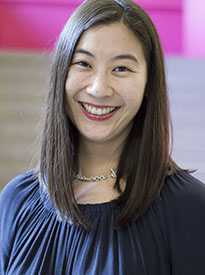 Jennifer Lee
Jennifer Lee
Title: Made in Canada
Thursday, March 28, 2019, 5-6 p.m.
Sandford Fleming, room 1105
Abstract: In this talk, Jen will share her experience of taking the reins of an existing business and figuring out a way to make it her own. She will discuss the origins, growth story and changes afoot at Solidwear Enterprises, her family’s business. If you’ve ever wondered how to take an existing idea or business and evolve it into something that’s relevant to a new audience and changing contexts, Jen will share her stories on what’s worked and what’s failed.
Bio: Jen is the VP of Business Operations at Solidwear Enterprises, a domestic apparel manufacturing business. She began her career as a management consultant at Accenture, focussed on building the firm’s Sustainability and Strategy practice. Jen is a mentor at WeWork Labs, and sits on the Advisory Board for the Creative Destruction Lab. She holds an Honours B.A. in Economic Development from McGill University and a MBA from the University of Toronto. Jen is also a proud alumnae of the Bishop Strachan School.
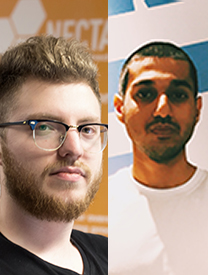 Maxim Antipin & Saif Abid
Maxim Antipin & Saif Abid
Taking the G out of GUI: Engineering Invisible Solutions
Thursday, September 21, 2017, 5-6 p.m.
Sanford Fleming, room 1105
Abstract: In this talk we’re going to discuss how we started SwiftPad and spent hundreds of hours building rich mobile & web applications for healthcare until realizing the expensive lesson that the most powerful solutions are ones that are invisible to the user.
Bios: Maxim Antipin holds a BASc in Electrical Engineering with a Minor in Engineering Business from the University of Toronto. He is the co-founder of the healthcare technology company SwiftPad, which is an IBM Innovation Partner and 2016 UTEST alumni. Maxim also volunteers his time as an executive committee member at IEEE Toronto where he received the “Outstanding New Leader” award in recognition of leadership in the first year. Maxim is passionate about the intersection of engineering and business in the healthcare industry. His capstone project “Indoor Auditory Navigation” was the recipient of the “2017 CNIB Hochhausen Prize”. He continues to strive for positive change in Canada’s healthcare system by empowering & connecting pharmacists with innovative technology.
Saif Abid is a Computer Engineer from the University of Toronto and CTO of SwiftPad – a healthcare company which is also an IBM Innovation Partner. Saif has a deep interest for Golang, distributed systems, data engineering and as of recent, functional programming. When he’s not reading research papers and textbooks for fun, you can find him in the gym or out on a jog. Saif is a big believer in solving problems which impact individuals on a global scale. For example, as his Capstone project, he helped build an “Indoor Auditory Navigation” system for the visually impaired. The project went on to receive the “2017 CNIB Hochhausen Prize”. Ultimately, Saif’s passion is to build novel engineering solutions to help those who need it the most.
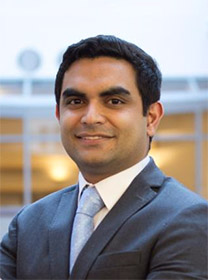 Aditya Kapoor
Aditya Kapoor
Entrepreneurship- When you don’t know what you don’t know…
Thursday, October 12, 2017, 5-6 p.m.
Sandford Fleming, room 1105
Abstract: In this talk, I will go through my journey as an entrepreneur trying to organize an informal sector like astrology in the Indian market through a family venture (www.astroYogi.com), the challenges of replicating the experience in digital healthcare with my start-up OyeHelp.com, and why not to build businesses for VCs and angel investors.
Bio: Aditya Kapoor is a second year full time MBA student at Rotman School of Management. He trained as a lawyer in India and briefly worked as an energy lawyer before quitting to join his family venture, astroYogi. astroYogi started as a content licensing company, tying up with MSN, Yahoo and Google, among others, and eventually transitioned into a service platform connecting astrologers/tarot readers to customers in a marketplace model. Using this experience, Aditya co-founded OyeHelp, a digital healthcare platform, aimed at connecting doctors to patients using video and cloud telephony.
Aditya also headed the digital marketing and technology initiatives for Indian Prime Minister Narendra Modi’s campaign in 2014 and aims to be involved at the intersection of social media, technology and political campaign management.
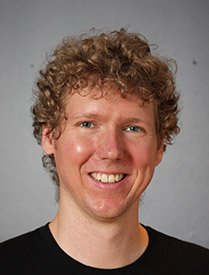 Steve Cosman
Steve Cosman
Scaling from Zero to Millions: Lessons from growing a consumer startup
Thursday, October 26, 2017, 5-6 p.m.
Sandford Fleming, room 1105
Abstract: Steve founded Shoebox in 2012 and has grown it to millions of users. In this talk he’ll discuss various lessons learned about growing an early stage startup spanning technology, marketing, culture and more.
Bio: Steve is the co-founder and CEO of Shoebox. Shoebox is a consumer cloud service used by millions of users to help people relive their best moments everyday. Prior to Shoebox, Steve worked in computer vision and augmented reality at Microsoft.
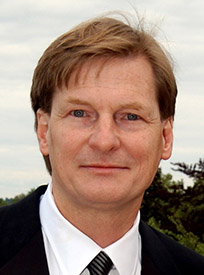 Jerry Evans
Jerry Evans
3D Printing – Using Technology for a Higher Purpose
Thursday, January 25, 2018, 5-6 p.m.
Sandford Fleming, room 1105
Abstract: There are more than 30 million individuals in the world living with mobility challenges and only 1 in 10 have access to the prosthetic and orthotic (P&O) devices they need to allow them to walk.
Jerry will be discussing how Nia Technologies Inc. (Nia) is leveraging 3D printing to increase the efficiency of P&O device production in resource poor countries. The hope is that Nia’s innovations will allow existing orthopaedic workshops to help more people.
Starting four years ago as a simple proof-of-concept research/development collaboration between cbm Canada and U of T, Nia is now a stand-alone non-profit social enterprise. Nia continues to work with its partners to further develop its 3D digital tools for the P&O industry, known as 3D PrintAbility.
With the support of Grand Challenges Canada, Google.org, Autodesk Foundation and others, Nia has successfully completed the largest-ever clinical study of 3D printed prosthetics and orthotics (in Uganda, Tanzania and Cambodia) and is now scaling up and preparing to deploy 3D PrintAbility in a number of countries.
Bio: Jerry graduated from U of T with a BASc and a MASc in Civil Engineering. He went on to get his MBA from UWO. Jerry has spent most of his professional career working in finance, corporate strategy and governance. Today he is CEO of Nia and travels extensively in support of Nia’s efforts.
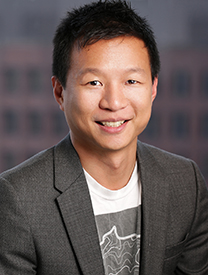 Nelson Wu
Nelson Wu
Using fear and weakness as fuel for progress
Thursday, March 1, 2018, 5-6 p.m.
Sandford Fleming, room 1105
Abstract: Nelson’s journey from being a student at the University of Toronto to building Massdrop in San Francisco. In this talk, we’ll discuss fear and weakness, and the role both play in our personal and professional life.
Bio: Nelson graduated from University of Toronto in 2008 and he is the co-founder of Massdrop. Massdrop is a community-driven commerce platform. We make products with input from our members and give them a place to connect, learn, and shop with people who share their interests.
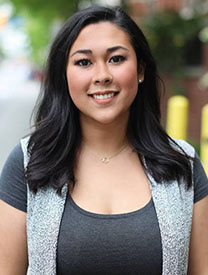 Emily Lonetto
Emily Lonetto
What on earth is growth? (How to become a ‘growth’ minded leader)
Thursday, March 8, 2018, 5-6 p.m.
Sandford Fleming, room 1105
Abstract: From music to business, to high growth startups — in this talk, we’ll discuss the differences in between growth, product, and marketing and how new-age companies need to bake ‘growth’ directly into their user experience, no matter the industry. Afterward, we’ll go deep on how many high-growth startups like Tilt, Airbnb, and many other Y-Combinator startups are focusing on retention and technical empathy to build more versatile teams and structure their growth roadmap.
Bio: Prior to heading growth at GrowSumo (YC’15), Emily Lonetto helped grow Tilt (acquired by Airbnb) from an American micro-crowdfunding company to one of the fastest growing payments apps – ever. During her time at Tilt, Emily combined her background in business, product, and design to build new features and scale Tilt’s ambassador program internationally. Emily approaches growth in a scientific yet creative way and continues to push for rapid experimentation as the Head of Growth at GrowSumo: a marketplace, and platform that allows companies to scale through automated partnership channels. GrowSumo has since helped companies like Evernote, Intuit, and Samsung scale their community and reach their growth goals.
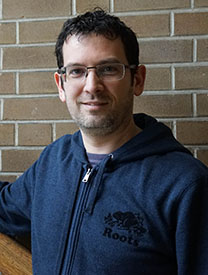 Jared Ross
Jared Ross
Disrupting Dining – How technology is changing the restaurant industry
Thursday, March 8, 2018, 5-6 p.m.
Bahen Centre, room 1190
Abstract: For decades, the restaurant industry has remained relatively unchanged, with little innovation. Perhaps more than any other industry, new technologies are having the biggest impact in disrupting the traditional restaurant experience. These technologies range from the well-known customer-based delivery apps, to lesser known kitchen inventory ordering platforms, to fully integrated real-time backend sales tracking databases. In this discussion, Jared will talk about how technology has changed his business, and the need to remain current in an industry known to have among the highest failure rates.
Bio: Jared founded Veda Healthy Indian Takeout in 2005 after completing is MBA at the Rotman School at U of T. He saw a hole in the market for Healthy Indian Fast Food, and wanted to create something that had not been done before. During his two-year MBA, Jared focused a majority of his studies on developing a sound business plan, constantly trying to disprove his concept. Since then he has successfully opened several restaurants, and now focuses on campus eateries, as well as a fast-growing campus catering business at the University of Toronto. With an expertise in both on- and off-campus food service, Jared was recently invited to Zhuhai, China — known for its abundance of high quality Universities — as a consultant to a major developer Chinese universities.
Prior to returning to school at U of T to obtain his MBA and subsequently launching Veda, Jared completed a Bachelor of Commerce (Honours) degree with a double-major in Finance and Marketing at the University of Manitoba. During his undergraduate studies, Jared worked nights at RBC at one of Canada’s first inbound banking call centres. This part-time job at RBC led Jared to move to Calgary with RBC, upon graduation, working in its high net worth discretionary wealth management division.
‘From Toronto to San Francisco’
Thursday, Sept. 15, 2016, 5-6 p.m.
Sandford Fleming, room 1105
Abstract: Yuri will discuss transitioning from undergrad to start-up founder, building his business, raising multiple rounds of financing from top institutional investors, as well as the decisions that led him to stay in the Bay Area. Yuri will also discuss his experience going through Y-Combinator, and answer any questions students may have about applying.
Bio: Yuri Sagalov is a EngSci 0T8+PEY grad. After starting his MASc in the ECE department, Yuri took a leave of absence to start AeroFS in 2010. Yuri is a part-time partner at Y-Combinator, the acclaimed Silicon Valley accelerator whose notable alumni include Reddit, Dropbox, AirBnB, and Stripe.
‘Whirlscape, from U of T to Real Company’
Wednesday, Sept. 28, 2016, 5-6 p.m.
Sandford Fleming, room 1105
Abstract: Xavier will talk about the story of Whirlscape, whose first product the Minuum Keyboard started as Master’s research at the University of Toronto before going viral on Indiegogo. Since then, Whirlscape has gone to the Y-Combinator in the Valley and come back, has shipped over a million (virtual) keyboards, has raised investment and most recently launched its second product, Dango, which uses neural networks to predict emoji, stickers and GIFs.
Bio: Xavier did his undergraduate in Engineering Science at U of T (and attended the Engineering Entrepreneurship Series as an audience member). He did part of an MSc in computer vision before co-founding Whirlscape. At Whirlscape he wears many hats but his favourite hat is that of the algorithm designer, making complex data-driven NLP apps run in real-time on-device.
‘A small startup getting acquired by Kik’
Thursday, Oct. 2o, 2016, 5-6 p.m.
Sandford Fleming, room 1105
Abstract: In this talk, we will cover 1. why we pursued an acquisition, and particularly to a tech company like Kik, 2. How the process was and what were the obstacles and 3. What the outcome was and the pros and cons of getting acquired
Bios: Shums Kassam studied in the ECE option of Engineering Science. For his PEY, Shums started his first company, Blynk, and worked for himself. A year later, Blynk was acquired by Kik, a messaging app company with over 300 million users and a valuation of over one billion dollars. Today, he works as the Technology Lead of Retail at Kik. But he still hasn’t graduated from EngSci.
‘Bachelors, Masters, PhD, Start-ups, and the birth of MedChart’
Thursday, Oct. 27, 2016, 5-6 p.m.
Sandford Fleming, room 1105
Abstract: James will share his experience on founding MedChart while obtaining a Master’s at the University of Toronto. He will recount his journey from identifying a solution to a simple problem to raising $1M and building a viable business. He will discuss serial entrepreneurship, his experience trying to find the right idea and the right team, and leveraging the rich University of Toronto and Toronto start-up scene to launch your idea.
Bio: James is a leader, life-long-learner, and is passionate about entrepreneurship. His journey started when he co-founded a family business with his father in 2003 and earned his Red Seal license in carpentry. He owned and operated the company until 2009 when he decided to pursue Engineering Science at the University of Toronto. In 2013, James graduated with honours and a certificate in Engineering Business while also serving on Governing Council and its sub-committees. In early 2016 he obtained the M.A.Sc. in Electrical and Computer Engineering and was awarded the NSERC PGS-D scholarship to pursue his Ph.D. at U of T.
James’ pursuit of entrepreneurship has led him to found and co-found three companies during his time at the University of Toronto: Covalent Construction (2009), Devra Sports (2010) and MedChart in 2015 with Derrick Chow. He was motivated to found MedChart after experiencing the pain of trying to get medical records to assist in coordinating care for a dying family member in 2013. As CEO, he has successfully led MedChart to win top prizes from the Entrepreneurship Hatchery and Start@UTIAS accelerators in 2015 and receive $1M in investment and in-kind contributions to seed his start-up. James believes that there is a true demand for easy access to personal medical records and approaches each day with an entrepreneurial spirit seeking “problems” to be solved.
‘Never check the boxes, focus on re-drawing the lines’
Thursday, Nov. 9, 2016, 5-6 p.m.
Sandford Fleming, room 1105
Abstract: Danish will tell us how he eventually got to pursuing what he was most excited about, rather than trying to fill various boxes. Engineering, IBM, McKinsey, MBA: all of them felt like steps that he was supposed to take. The challenge with this strategy was that, every time he checked a box, two more were added to his list. So, it was a never ending battle for Danish, and one that was inherently focused on proving himself to others, as opposed to truly doing what he was excited about. The longer he continued down that path, the harder it was to stop. It was only last year that, he finally admitted to himself that he is a technologist at heart, and that he will be mostly fulfilled solving problems, rather than helping others solve problems. He quit his job at McKinsey, and founded Zensurance, an insurance company for small businesses. Even though some people think he made an irrational decision, he has never been more excited about getting to work each day.
Bio: Danish Yusuf is a former leader in McKinsey’s Digital Insurance practice, supporting insurance clients globally on defining their digital strategy. Prior to McKinsey, Danish was a software architect and developer at IBM Canada, covering everything from JCL/PL1 to Java and web development. Danish earned a bachelor’s degree in Software Engineering from University of Toronto, and has an MBA from Harvard Business School.
‘Engineer to Social Entrepreneur’
Thursday, Feb. 16, 2017, 5-6 p.m.
Sandford Fleming, room 1105
Abstract: Chakameh will talk about the drastic change in her career from a Mechanical Engineer to a mental health entrepreneur.
Bio: Chakameh graduated from U of T in 2012 with a BASc in Mechanical Engineering. After graduation she worked at GE as an ITLP, before leaving to start TranQool.
‘Serial entrepreneur and venture capitalist: prospectives from both sides of the fence’
Thursday, Mar. 9, 2017, 5-6 p.m.
Sandford Fleming, room 1105
Abstract: Dennis will share anecdotes and lessons learnt in a career that started as a chartered accountant and culminating today as a angel investor. He will relate challenges and hurdles as a serial entrepreneur that go back to pre-venture capital being available and his experiences in pioneering technology companies. As a passionate entrepreneur that’s always learning. He enjoys sharing stories of success and failures, having been on both sides of the fence as a serial entrepreneur, raising much needed funds, investing as a venture capitalist and now mentoring/investing an angel investor.
Bio: Dennis Bennie is a pioneer and innovator in the Canadian technology industry. Over the past 30 years he has co-founded several companies including, Mission Electronics, Ingram Micro Canada, Delrina Technology (NASD:DENAF), Delano Technology (NASD: DTEC), Appinions and Newtopia. He has managed venture capital funds under the XDL Capital Group which have invested in over 60 technology startups since 1996.
In 1988 he co-founded and was CEO of Delrina Technology, listed on TSX and NASDAQ until it was acquired by Symantec in 1995. He then formed XDL Venture Capital Group which raised a total of $180m in venture capital funds. XDL Capital Group continues to actively invests using personal funds in early stage opportunities. Current investments include: Nuco, Nymi, Linkett, Edsby, Vouchr and Mill St Brewery.
Mr. Bennie is one of the founders of Creative Destruction Lab, and regularly serves on various charitable boards. He qualified as a Chartered Accountant in 1975 graduating from University of Witwatersrand.
His most important role is being a grandfather, father and husband.
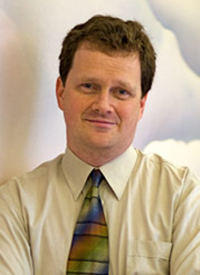 Keith Thomas
Keith Thomas
‘What do you think about that?’
Thursday, Sept. 24, 2015, 5-6 p.m.
Bahen Centre, room 1200
Abstract: An engineer who never worked as an engineer, Keith Thomas has not had a typical career for an engineering grad. He started as a banker in Europe, restructured companies in the US, Brazil and Australia and then returned to Canada to build companies. He will provide some insight on what has driven him through his unconventional career, insight that may be helpful in opening your eyes to the possibilities that an engineering background can bring.
Bio: Keith Thomas is a proven entrepreneur and was most recently CEO of Vector Innovations, which was backed by a number of well-regarded venture firms and successfully exited. He has led a number of large-scale projects, restructuring companies in 3 countries at New York-based Tandon Capital, managing strategy and operations projects at Booz Allen & Hamilton and completing corporate finance transactions at Citibank in the US and Europe. He is a member of the Young Presidents Organization (YPO) and a Governor of the University of Toronto. He holds an M.B.A. from Columbia University, an M.A. in Economics and a B.A.Sc. in Engineering from the University of Toronto.
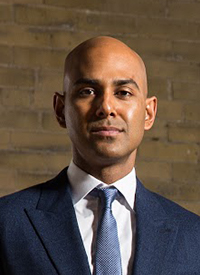 Somen Mondal
Somen Mondal
‘Engineering to Entrepreneurship: How I built and sold a software company using my engineering degree’
Wednesday, Oct. 7, 2015, 5-6 p.m.
Sandford Fleming, room 1105
Abstract: Somen Mondal successfully built and sold (in the tens of millions) a software company. Learn how he used his engineering degree and analytical thinking to build his company successfully.
Bio: Somen is a Canadian entrepreneur and the Co-Founder & CEO of Ideal Candidate. Ideal Candidate matches talented salespeople with their perfect sales job, maximizing the earning potential of both candidates and employers. Prior to Ideal Candidate, Somen served as Co-Founder & CEO of Field ID until it was successfully acquired by Master Lock LLC (a subsidiary of NYSE:FBHS) in December 2012. Somen’s leadership has helped earn Field ID a spot on the Profit Hot 50 and Deloitte Fast 50 Companies-to-Watch lists. In 2012, Somen was named winner of the Ontario Ernst & Young Entrepreneur of the Year award in the “Emerging Entrepreneur” category.
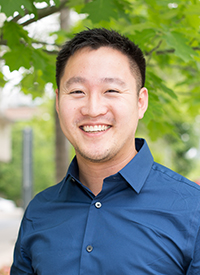 Gimmy Chu
Gimmy Chu
‘The Story of Nanoleaf’
Wednesday, Oct. 28, 2015, 5-6 p.m.
Sandford Fleming, room 1105
Abstract: Gimmy will share Nanoleaf’s origin story, from its roots at the University of Toronto to launching the world’s most efficient lightbulb. He’ll describe the company’s growth and expansion, where they are today and what might come next.
Bio: A University of Toronto ECE graduate, Gimmy has over seven years of experience as a technology consultant. He has delivered projects for numerous clients across North America including TD Bank, Hawaiian Telcom, Frontier Communications, Best Buy, and Jack in the Box. He is now leading the effort in sourcing affordable and suitable components for the Nanoleaf as well as managing the planning and execution of the Nanoleaf products as one of the company’s founders and its current CEO.
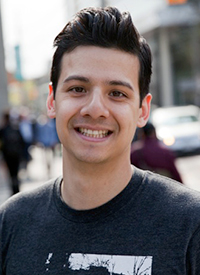 Michael Ho
Michael Ho
‘Startup Life – The School of Hard Knocks’
Thursday, Nov. 12, 2015, 5-6 p.m.
Sandford Fleming, room 1105
Abstract: Hear the story about the ups and downs of starting two companies, growing & selling one and despite all the hard knocks along the way, why I would do it all over again.
Bio: Michael was the founder and CEO of Bering Media (acquired by Audience Partners in 2014), the leading media and audience platform for broadband Internet service providers and mobile network operators. Currently, Michael is the CTO at Audience Partners, where he leads the vision and development of their addressable advertising platform, Flight Deck. In 2008, Michael invented Bering Media’s unique doubleblind privacy technology – the gold standard for privacy in the industry – and led the development of the Broadband Interconnect – comprising 7 of the top 10 broadband providers in the US. Prior to Bering Media, Michael was part of Sandvine’s North American sales team, playing a key role in helping ISPs better understand their networks and evaluate online advertising solutions. Michael started his career as a developer at Nortel Networks and as the founder of a peer-to-peer security company, Octium Logic. Michael holds a degree in Electrical Engineering from the University of Waterloo.
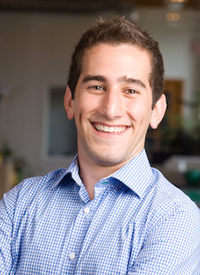 Bijan Vaez
Bijan Vaez
‘Scaling a Software Company to Tens of Millions With No Investment’
Thursday, Jan. 14, 2016, 5-6 p.m.
Bahen Centre for Information Technology, room 1200
Abstract: Bijan will have an off-the-cuff discussion on the challenges, opportunities and stories of starting a company while he was still an ECE student. From the technical challenges faced early on, to understanding how to do business in unfamiliar industries, and how to build and motivate teams. He’ll walk through his experiences and different stages of growth as EventMobi was built out by 2 people with $0 in funding, to now a multimillion dollar profitable business with thousands of clients and millions of users worldwide.
Bio: Bijan is co-founder and CTO of EventMobi. He has spent the last seven years designing, architecting, & developing large scale cross-platform mobile and web applications, but now spends most of his time trying to figure out how best to scale technology teams. Previous to EventMobi, Bijan built an award-winning medical diagnoses iOS app, was part of the discrete graphics team at AMD and cofounded a real-time RFID asset tracking consultancy. Bijan holds a BASc in Computer Engineering from the University of Toronto and can be found at @bijanv.
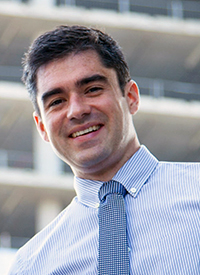 Michael Gray
Michael Gray
‘The Story of Cast Connex’
Wednesday, Jan. 20, 2016, 5-6 p.m.
Bahen Centre for Information Technology, room 1170
Abstract: Michael will tell the story of the creation of Cast Connex and its growth into a leading innovator in the construction industry. He’ll share his experience in the early days, discuss his motivation for choosing an unconventional career path and provide insight into challenges his business has faced as it’s grown from University of Toronto startup to a major player in iconic building projects across North America.
Bio: An inventor of the technology behind the Scorpion Yielding Connector and a co-founder of the company, Michael is the Executive Vice-President at Cast Connex Corporation. He received both his Bachelor of Applied Science and Engineering and his Doctor of Philosophy in Structural Engineering from the department of Civil Engineering at the University of Toronto. Michael’s ground-breaking Doctoral work on the use and design of cast steel yielding elements in high-ductility non-buckling braced frames forms the basis of the Scorpion line of products. Michael has won several prestigious provincial, national, and industry scholarships and fellowships including the Steel Structures Education Foundation (SSEF) G.J. Jackson Fellowship, the Canadian Institute of Steel Construction John L. Kellerman Fellowship, and the Canadian Society for Civil Engineering Donald Jamieson Fellowship in Structural Engineering. In addition to his expertise in non-linear finite element analysis, seismic design, mechanics, and low cycle fatigue of steel materials, Michael also has extensive experience in structural engineering and steel connection design and detailing.
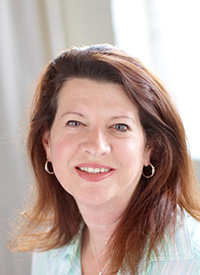 Susan Mey
Susan Mey
‘The Green Cricket Story: A Startup in All-Natural Personal Care Products’
Thursday, Feb. 4, 2016, 5-6 p.m.
Sandford Fleming, room 1105
Abstract: This is the story of how a U of T law school graduate and corporate lawyer took a 180 degree turn to start Green Cricket in 2008; one of Canada’s leading all natural personal care brands sold in the health and wellness industry. The story starts with building a web store to sell other brands in the recession of 2009, to becoming a brand owner and developer with 34 retail products today as well as a line of commercial formulations oriented towards spas, schools and clubs. Hear about the successes and failures along the way.
Bio: Susan Mey is the President and CEO of The Green Cricket Inc., a business specializing in natural and organic environmental products. She has a B. Admin from the University of Ottawa and a Juris Doctor in law from the University of Toronto. Her company, the Green Cricket uses international standards to produce green products for retail sale since its inception in 2008. Before her involvement with The Green Cricket Inc., Ms. Mey co-founded a Hong Kong-based medical imaging software company in 1991, where she served as Managing Director until 1997. She has also worked in various capacities for other corporations such as the Eastman Kodak Company, and the T. Eaton Company and serves as the Chair of the Baker Centre Health Care Foundation board since 2003. She is also a member of other boards of both public and private companies.
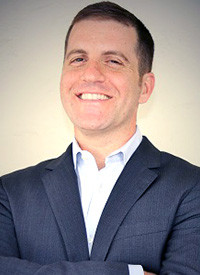 Amos Adler
Amos Adler
‘From reminders to relevance algorithms: How I followed the data’
Thursday, Feb. 11, 2016, 5-6 p.m.
Sandford Fleming, room 1105
Abstract: Before the days of smartphones and shared calendars, my wife would send me long emails with multiple to-dos. I wanted a tool that would let me know exactly when I needed to know something, as opposed to parsing and prioritizing all the things in her email. So I built my own database driven web-based reminder start-up MEMOTEXT. Initially created as a ‘virtual nagging machine’ MEMOTEXT was meant for reminding and collaboration. What ended up happening was that 87% of people signing up of the few hundred that did used the service for medication reminders so we pitched a pharma wondering if it would work. Following the data became a mantra and MEMOTEXT kept expanding and specializing in using disparate sources of health data for engagement purposes. We went from linear thinking to building methodologies to validate personalization algorithms. Being an entrepreneur has it challenges. Success isn’t linear, and you have to enjoy pain. My path has not been traditional which has its plusses and minuses. Having said this I believe that my path has strengthened the more I followed my own rules.
Bio: Amos brings speech, mobile and social technologies together to create mobile (mHealth) and telehealth patient adherence programs. Since 2008, Amos has led the design and deployment of dozens of digital patient adherence and behavior change programs globally while advocating for evidence-based approaches to technology-based behavior change. With a background in user oriented design methodologies, user-requirements elicitation, finance and enterprise scale technology deployment, Amos focuses on solutions solving real-world business requirements with patient centered designs while understanding the challenges of change management in clinical settings. Prior to founding MEMOTEXT, Amos held multiple technology and finance related positions within the Bell Canada Holdings family of companies as well as a background in social and private real estate development. Amos holds a M.Sc. in Analysis, Design and Management of Information Systems from The London School of Economics in London England, graduating with distinction was highlighted by his work within the launch of the world’s first independent exchange for international wholesale telecom capacity. Amos speaks regularly at events such as: mHealth, Stanford Medicine X, Health Datapalooza, Genentech FutureMed2.0 and guest lectures at the University of Toronto.
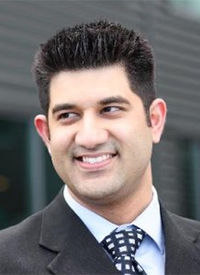 Ahmed Badruddin
Ahmed Badruddin
‘Naïve Optimism – How It Can Power your Idea to Massive Disruption’
Thursday, March 3, 2016, 5-6 p.m.
Sandford Fleming, room 1105
Abstract: A few years into a great career at Microsoft, Ahmed began exploring what role software technology should be playing in addressing one of this generation’s greatest challenges: managing our scarce natural resources. This led him to quit his job and move back to Toronto to start WatrHub and begin transforming the way water is managed by cities across North America. Ahmed will share all the ups and downs in his journey as he has pursued his life-long passion for technology and its role in making the world a better place. He’ll share his insights and perspective on why Naïve Optimism is a key ingredient to powering your business idea into massive disruption.
Bio: Ahmed is CEO of WatrHub Inc., a fast-growing, Toronto-based analytics company which has been internationally recognized for its innovation in and disruption of the $600B water industry. He is passionate about bringing forth new paradigms of efficiencies and revealing hidden value propositions in massive, slow-moving, risk-averse industries, by developing a perfect mix of revolutionary technology and innovative business models. Prior to WatrHub, Ahmed worked in various technology leadership roles at Microsoft building consecutive versions of their flagship Windows product. He led a globally distributed development team based out of the U.S., India, and China, deriving novel ways to improve team workflows and information exchange. Ahmed has a Bachelor’s of Applied Science from the University of Toronto in Electrical & Computer Engineering. Outside of work, Ahmed is a big soccer and American football fan. He also can’t resist a good BBQ experience, so he uses predictive analytics to solve for his nth+1 restaurant to visit!
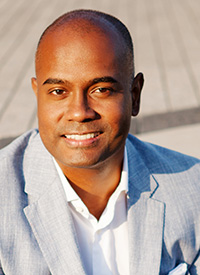 Bahi Kandavel
Bahi Kandavel
‘Quantitative Strategies in Electricity Markets: The Northstar Trading Story’
Wednesday, March 16, 2016, 5-6 p.m.
Bahen Centre for Information Technology, room 1210
Abstract: Wholesale electricity markets have undergone a recent period of deregulation and granularization starting in the late 90s, leading to today where financial power contracts are traded in a number of regional nodal electricity markets. This talk highlights the role and growth of financial participants—including Northstar Trading which was founded by the speaker two years ago—in these emergent markets.
Bio: Bahi Kandavel founded Northstar Trading and is currently performing the role of Trading Director. Previously, Bahi was trading short term financial power at Cobalt Capital Management. Bahi was the former Head Trader at Jump Power, the power trading unit of Jump Trading. Prior to launching Jump Power, Bahi was a Senior Energy Trading Associate at DC Energy, a leading power marketer in the metropolitan Washington DC area, and an Associate at Northwater Capital, a multi-billion dollar Toronto-based fund of hedge funds. Bahi is a CFA Charterholder, holds a Master’s in Mathematical Finance, a BASc in Engineering Science from the University of Toronto, and PhD in Finance at the EDHEC-Risk Institute.
Daniel Debow
‘Stories from the Trenches’
Sept. 25, 2014, 5-6 p.m., Sandford Fleming 1105
Abstract: Hear the story of a serial entrepreneur. Get specific tips on taking a vision and moving it to reality.
Bio: Daniel is an SVP at Salesforce.com, where he drives marketing for Salesforce Work.com, a sales performance management solution that helps Facebook, LinkedIn, Spotify, and other innovative companies align, motivate, and drive the performance of their sales teams. Prior to joining Salesforce, Daniel was co-founder and co-CEO of Rypple, a social performance management platform acquired by Salesforce in 2012. Prior to Rypple, Daniel was on the founding team of Workbrain, which provided workforce management solutions to Wal-Mart, Citibank, and other large enterprises. Workbrain grew to $100 million in annual revenues before being acquired by Infor in 2007. A sought-after speaker on how social media is changing the workplace, Daniel is a contributor to Fortune.com and the Huffington Post. He’s been widely quoted in Wired, the Financial Times, the Economist and Bloomberg Businessweek. Daniel holds a JD/MBA from the University of Toronto and an LLM in Law, Science and Technology from Stanford University.
Shana Kelley
‘New Diagnostic Technologies for Effective Disease Management’
Oct. 1, 2014, 5-6 p.m., Sandford Fleming 1105
Abstract: The analysis of molecular biomarkers offers valuable diagnostic and prognostic information for clinical decision making. Robust, practical platforms that detect low levels of biomolecules (< 1000 copies) are urgently needed to advance medical care by diagnosing and predicting the progression of cancer and other disease states. We have developed a new class of chip-based sensors that can rapidly report on the presence of infectious disease. The basic research done to engineer the sensing platform will be described, as well as the further development of the approach into clinic-friendly instrumentation.
Bio: Dr. Shana Kelley is a Distinguished Professor of Biochemistry, Pharmaceutical Sciences, Chemistry, and Biomedical Engineering at the University of Toronto. Dr. Kelley received her Ph.D. from the California Institute of Technology and was a NIH postdoctoral fellow at the Scripps Research Institute. Her research interests are the development of new technologies for clinical diagnostics and drug delivery. Dr. Kelley’s work has been recognized with a variety of distinctions, including being named one of ‘Canada’s Top 40 under 40’, a NSERC E.W.R. Steacie Fellow, and the 2011 Steacie Prize. She has also been recognized with the Pittsburgh Conference Achievement Award, an Alfred P. Sloan Research Fellowship, a Camille Dreyfus Teacher-Scholar award, a NSF CAREER Award, a Dreyfus New Faculty Award, and was also named a “Top 100 Innovator” by MIT’s Technology Review. She is a founder of two molecular diagnostics companies, GeneOhm Sciences (acquired by Becton Dickinson in 2005) and Xagenic Inc.
Farhad Shafai
‘A Tale of Two Startups’
Oct. 23, 2014, 5-6 p.m., Sandford Fleming 1105
Abstract: Farhad Shafai is the founder of two technology companies. One was a venture capital-funded company that eventually shut down despite developing superior technology and capturing a global customer base. The other was a bootstrapped company that was acquired because of developing superior technology and capturing a global customer base. Clearly having superior technology and a global customer base is not enough. Concentrated focus is required to translate that technological advantage and customer base into a money making enterprise. This presentation discusses Farhad’s experiences in founding SiberCore Technologies in 1998, and Sarance Technologies in 2004. The life cycle of both companies are presented from their inception to their completion, along with the existing market conditions and the decisions made by the two companies that led to the eventual outcome of each company.
Bio: Farhad Shafai received his Bachelor’s degree in Engineering Science, Electrical option, from the University of Toronto in 1995. From 1995 to 1998, Farhad worked for Nortel Networks as an Integrated Circuit Design Engineer and was the primary designer for the world’s first multi-megabit high-speed Content Addressable Memory device. In the summer of 1998, Farhad left Nortel Networks and founded SiberCore Technologies specializing in integrated circuits targeted for the internet infrastructure equipment. SiberCore grew to be a multinational fabless semiconductor company with customers in North America, Asia and Europe. Farhad is one of the principal innovators responsible for the technology developed at SiberCore. In addition to technical work, Farhad helped grow SiberCore’s engineering team to a peak of 45 people in 2001. He was also involved with fund raising and general management activities between 1998 and 2000. In 2004, Farhad started Sarance Technologies focused on design services and intellectual-property development for the semiconductor market place. In seven years, Sarance established itself as the leading provider of intellectual property to network equipment vendors and semiconductor companies all over the world. It grew to a multi-million dollar company with its products used in pretty much all Internet equipment produced since 2008. In 2011, Sarance was acquired by Xilinx. Farhad is a Senior Director at Xilinx and runs its Canadian engineering operations. Farhad won the Canarie IWAY award for New Technology Development in 2001 and holds 16 US patents in the fields of circuit, ASIC and system design.
Henry Chong
‘Electric is Now: How Revelo is Reimagining Personal Electric Transportation’
Nov. 19, 2014, 5-6 p.m., Bahen Centre for Information Technology 1210
Abstract: Henry Chong is the founder and CEO of Revelo Electric Corp. and he will speak about his company’s mission to revolutionize personal electric transportation through design innovation. In 2014, Revelo was recognized as one of “10 Canadian Startups You Should Know About” by Business Vibes and “21 Coolest Small Businesses in Toronto” by Business Insider. Their flagship is the award-winning LE-1 (Lite Electric One). At under 14kgs it is one of the world’s lightest compact electric bikes and the only one to feature an exclusive Dual Mode Crank chainless transmission. Henry will speak about the design philosophy of the LE-1, the challenges of creating and marketing a new type of vehicle, the emerging electric bike industry, the differences of manufacturing in Canada and China, and the importance on good design. To learn more about Revelo LE-1 please visit their website at revelo.ca.
Bio: Henry Chong is founder of Revelo Electric and the creator of the award winning LE-1. He is a maker and designer who believes that collaboration and imagination are the ingredients for change. Henry is passionate about improving urban environments and how we move in them. He is an avid cyclist and is constantly developing new ideas relating to transportation. Henry’s design philosophy centers around designing solutions that are truly beneficial and efficient while maintaining a beautiful aesthetic. He believes that good design challenges perceptions and informs of new great possibilities. Henry has created the LE-1 as a flagship product for Revelo to begin leading the design revolution in the electric bike market. Henry holds a degree in Mathematics from the University of Waterloo, and an Industrial Design degree from the Ontario College of Art and Design University.
Leor Grebler
‘Hacking Kickstarter: How UCIC raised $230K to Kickstart the Ubi Project’
Nov. 26, 2014, 5-6 p.m., Sandford Fleming 1105
Abstract: Have you seen an idea on Kickstarter and said to yourself, ‘I can do that!’? The founders of the Ubi thought that too! Except it was a lot harder than they could imagine. Learn the strange journey, the successes, and the failures, that allowed them to get the Ubi off the ground.
Bio: Leor Grebler is a co-founder and CEO of Unified Computer Intelligence Corporation (UCIC), a company dedicated to The Internet of Things (IoT) market space. UCIC’s initial IoT product offering is the Ubi – The Ubiquitous Computer – a voice activated computing device that offers instant access to information and control of home automation devices. Leor steers UCIC towards its goal of making interaction with technology more human and natural. The Ubi was one of the most successful Kickstarter participants in Canada in 2012 (and even prior to Kickstarter’s formal entry into Canada in September, 2013), ranking 4th in Canada, raising $229,000 from 1,190 backers, representing ~700% of UCIC’s fundraising goal of $36,000. UCIC’s Kickstarter participation led to the Ubi’s beta development, UCIC winning the N100 startup competition in September of 2013 and a seed financing award of from N100 of $100,000 as well as to the completion of an Angel funding round through the Maple Leaf Angels in October 2013, all of which enabled UCIC to meet its Kickstarter commitment of delivering over 2,000 fully functioning Ubis by January 2014. The Ubi has been favourably profiled in the media by TechCrunch, Fast Company, Wired and Lang & O’Leary, to name a few. Leor has over eight years of technology experience including IBM and Clearpath Robotics and has worked with several startups such as The Funding Portal, where he saw the company from its launch through its first funding rounds. He holds a Bachelors in Aerospace Engineering from Carleton University. www.theubi.com twitter: @theubi
Paul Santerre
‘Biomedical Engineering Research and Broken Health Care Funding Practices Combine to Yield Eureka Entrepreneurial Opportunities’
Jan. 21, 2015, 5-6 p.m., Bahen Centre for Information Technology 1180
Abstract: Interface Biologics was co-founded in 2001 by Professor Santerre at the University of Toronto to develop technology in the focus areas of anti-thrombogenic additives that reduce clot formation, as well as programmable combination device/drug delivery systems. The name defines the critical interface between the human body and medical devices at the molecular level, and the company’s technologies accentuate simplified manufacturing know-how to keep production costs down, but highly innovative approaches which emphasis efficacious function impacting health care outcomes to reduce the burden on patients and medi-care resources.
Bio: Professor J. Paul Santerre has published >150 peer reviewed publications and is a listed inventor on >55 patents in the area of polymers, biodegradation, surface modification and drug delivery. He is a co-founder of Interface Biologics Inc (formed in 2001 with medical technologies being sold and developed in Canada, Europe and the US) and currently the director for Physical Science Faculty in Techna at UHN/UoT. He has been appointed an International Fellow of Biomaterials Science and Engineering (FBSE) (2004), a Fellow of the American Institute for Medical and Biological Engineering (2009) , a Fellow of the American Association for the Advancement of Science (2011), and a Fellow of the Canadian Academy of Health Sciences (2013). He has received several awards for his innovation and industry related activity including the Julia Levy Award from the Canadian Society for Chemical Industry for translation of knowledge to product and the Natural Sciences and Engineering Research Council of Canada’s Synergy Award in 2012.
Graham McKinnon
‘Be the Change You Want to See in the World’
Jan. 29, 2015, 5-6 p.m., Sandford Fleming 1101
Abstract: Many start-ups start up, but how do you get past simply starting up? Mohatma Gandhi understood success. Pushing boundaries comes with risk and success requires determination. Know the value of what you have and leverage that value appropriately—key early steps for start-up companies and start-up individuals. My start-up story reflects my experience with the many start-up companies I have seen find success and from those I have watched fade away. Common to all is a love for what they do.
Bio: Graham McKinnon founded his own patent prosecution firm in Toronto in 2010 and opened a Vancouver Office in 2012. Carbon Patents specializes in providing patent advice, particularly to local companies, including start-up companies and academic institutions. Graham has a Master’s Degree with honours in Biochemistry from Oxford University (1999) and is registered to practice before the Canadian Patent Office (2004) and the United States Patent Office (2005). He is also a member of both The Intellectual Property Institute of Canada and Association Internationale pour la Protection de la Propriété Intellectuelle. Graham has spoken internationally about intellectual property and collaborated with colleagues to draft proposed legislative changes to the Canadian Patent Act for consideration by Parliament.
Michael Helander
‘Course Correction: Leaving Academia to Found a Start-Up’
March 12, 2015, 5-6 p.m., Sandford Fleming 1101
Abstract: Michael will share his experiences as a graduate student at U of T, his choice to leave a successful academic career to found a start-up, and the trials and tribulations of trying to building a successful advanced manufacturing company in Canada.
Bio: Michael received a B.A.Sc. degree in Engineering Science and Ph.D. degree in Materials Science & Engineering from the University of Toronto. He has published 104 peer reviewed publications, 8 patents and 2 book chapters. He is a Governor General Gold Medal winner, Vanier Canada Graduate Scholar, and Chorafas Prize winner. Michael is Co-founder and President of OTI Lumionics Inc., an advanced materials start-up company working on low cost manufacturing solutions for organic light emitting diode (OLED) lighting and displays.
Ron Baecker
‘Software Entrepreneurship Success and Failure‘
March 18, 2015, 5-6 p.m., Galbraith 244
Abstract: To succeed (Silver’s Law of Venture Capital), you must identify a big problem, devise an elegant solution to the problem, and assemble an outstanding entrepreneurial team capable of turning the solution to the problem into a successful business. In other words, a valuation of your enterprise may be expressed as V = P X S X E, where
• P = Problem size (i.e., market; who cares?)
• S = Solution elegance (i.e., technology, products, services; so what?)
• E = Entrepreneurial team quality (i.e., why you?)
Note that if any of the three factors is zero, the product is zero.
I shall take each of these three concepts, elaborate on them, and illustrate with examples of success and failure, many of them based on my own experience in being a software entrepreneur for almost 40 years. I shall conclude by taking the concept of valuation and expand it to broader measures of success.
Bio: Ron Baecker is Emeritus Professor of Computer Science, Emeritus Bell Chair in Human-Computer Interaction, and founder and director of the Technologies for Aging Gracefully lab (TAGlab) at the University of Toronto. He has been named one of the 60 Pioneers of Computer Graphics by ACM SIGGRAPH, has been elected to the CHI (Computers and Human Interaction) Academy by ACM SIGCHI, has been given the Canadian Human Computer Communications Society Achievement Award and a Canadian Digital Media Pioneer Award, has been named an ACM Fellow, and was recently given a Canadian Association of Computer Science Lifetime Achievement Award. He has also previously done research or taught at Xerox PARC, Apple Computer, the MIT Media Lab, and in Management at the University of Toronto and UBC and in Cognitive Neuroscience at the Columbia University College of Physicians and Surgeons. His B.Sc., M.Sc., and Ph.D. are from MIT. He is Editor of the Synthesis Lectures on Assistive, Rehabilitative, and Health-preserving Technologies (Morgan & Claypool, Publisher). He has started five software companies, three of which he led as CEO. HCR was a world-class UNIX systems software firm that he co-founded in 1976. It was sold in 1990 to the Santa Cruz Operation. Expresto Software failed, and was sold in 2002 to a shareholder for its tax losses. Captual Technologies successfully commercialized the ePresence rich media webcasting and archiving system, and was sold in 2011 to Desire2Learn. Founded in 2011, MyVoice Inc. is a vendor of context-aware mobile speech aid apps. Currently, famli.net Communications Inc. seeks to address problems senior citizens have with social isolation and loneliness using the InTouch app. He also started in 1986 and taught for 25 years the university’s first course on high technology entrepreneurship.
